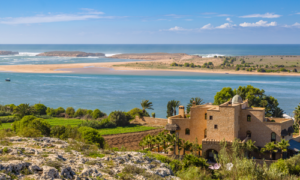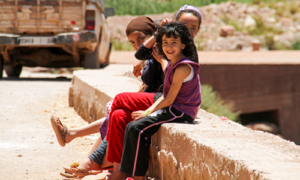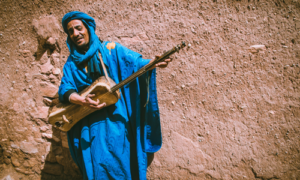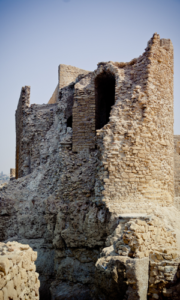In This City is a challenge to journey with us in prayer for 12 key cities in 2019. We ask you to commit to praying for fruit that will ripen and bear the seeds for mature, vibrant and multiplying churches across the Arab world. Find out more in this article from the leader of Pioneers’ Middle East Region.
Introduction
 We’re going from one coastal town to another. Goodbye to Sohar, Oman and hello to the ancient city of Safi, Morocco. Still known locally as ‘Asfi’ (which means flood or river estuary in Berber), the city’s name was Latinised as Safi under Portuguese rule.
We’re going from one coastal town to another. Goodbye to Sohar, Oman and hello to the ancient city of Safi, Morocco. Still known locally as ‘Asfi’ (which means flood or river estuary in Berber), the city’s name was Latinised as Safi under Portuguese rule.
Safi is a working-class city. Morocco is the largest exporter of canned sardines in the world, and Safi is the main fishing port for sardines. It is also a mass producer of phosphates and textiles.
Safi maintains a hot summer climate at the edge of the Atlantic and is a world-renowned surfing spot. From the vantage point of the 500-year-old Portuguese fortress on the waterfront, you can see what is described as the ‘city with two hearts.’ Old Safi is home to the potters’ district where artisans craft ceramics of terracotta and clay. You can see the old walled part of the city (medina) with its hundreds of narrow alleyways. New Safi, on the other hand, is where the bustle of business, property developments, and the cathedral lie. Sadly, however, Safi has a reputation in Morocco for high pollution and an uneducated populace.
About Safi
Population: <350,000
Religions (in Morocco): Muslim 99%, Christian 0.9%, other 0.1%. Safi is even less religiously diverse, with 99.99% adhering to Islam.
Ethnic groups: Mainly Arab and Berber. Years ago, Safi had a large Jewish community that represented more than 20% of the population. Most emigrated to France, Canada, or Israel.
Geographical size: 73 sq km | 28 sq mi. Have a proper look around the city by watching this video, produced by Yassine Boundouq.
Location: Central, West Morocco
Key historical events:
- One of the oldest cities of Morocco, Safi was first recorded as a Carthaginian colony in the fourth and fifth century.
- It came under Almohad Caliphate (Moroccan-Berber Muslim movement) in the twelfth century and functioned as an essential trading port for Marrakesh
- Taken over by the Portuguese in 1488. It was the centre of the Empire’s weaving industry.
- The Portuguese abandoned it to the Saadians during the war in 1541 as the city was difficult to defend from land attacks. Safi remained under Arab rule from the sixteenth century onwards.
- Foreign ambassadors used to come to Morocco via Safi as it was one of the largest and safest seaports from the 16th-18th centuries. Situated 150 km west of Marrakesh (then the capital), its maritime trade continued to expand. This was the city’s heyday.
- Between 1757-1790, Sultan Mohammed ben Abdallah banned all foreign trade through Moroccan ports except in his newly built city of Mogador. As Safi was no longer pioneering maritime trading, the city’s development dwindled.
- America attacked Safi during World War II. They took control over its port as part of Operation Torch, an Anglo-American alliance to invade French North Africa to enable invasion of Southern Europe.
Challenges
 The people
The people
The general populace dreams of relocating to a bigger city – such as Marrakesh or Casablanca – for more opportunities but financial and social class barriers are a great hindrance. Safi has a reputation for being polluted and dirty, and because its people have limited educational opportunities, they are often looked down upon by other Moroccans. Poor healthcare and a corrupt system of bribery are prevalent. There is a general sense of apathy for religion, but the appearance of being a devout Muslim is important.
 Seekers
Seekers
The people of Safi already face discrimination from other Moroccans; deviating any further from the norm would make life even harder. There is widespread family and work pressure to conform to Islam. The lack of biblical resources and isolation from the local church make it difficult to pursue Christianity. Those who do convert are often too afraid to meet with other local believers.
In the last twelve months, 1,765 Moroccans contacted our responders. Of those, 40 professed faith. A total of 29 face-to-face requests were made, but only 8 meetings occurred across the country. The fear of being discovered is crippling.
The team
Safi has no established, pre-existing local church. There are no formal language-learning schools, which means that studying either French or Arabic is challenging. There are very few educational opportunities for the next generation.
Prayer points
- Safi is a challenging place to share the gospel. There is a resistance to the Good News as it is seen as a ‘westernising’ or ‘foreign’ faith that undermines the local ways of life. It is easier to remain conformed to the Islamic culture. Pray for breakthrough in people’s hearts and minds.
- Local believers are generally fearful, and it is difficult for our team to have face to face interactions. Pray against fear and for a spirit of peace and boldness.
- For the few interested seekers, there is a lack of discipleship resources. There are logistical challenges in providing Bibles and other Christian literature in the local language. Pray that our innovative media ministry would continue to challenge hearts and that God would facilitate opportunities for much-needed resources to be delivered to the community.
- Pray for peace and stability for members of the Safi team. More long-term members are needed to increase our effectiveness and outreach in this city. Pray for times of refreshing and re-energising from the Lord, and that he would call more people with the right skills to join the team.
 One last thing…
One last thing…
One of our team members writes:
‘Please pray Ephesians 2:19-22 with us as we seek to see a local church established in this city. We long to see more believers gather regularly under the teaching of God’s Word and be sent out into their daily lives as ambassadors of the risen King Jesus.’
Consequently, you are no longer foreigners and strangers, but fellow citizens with God’s people and also members of his household, built on the foundation of the apostles and prophets, with Christ Jesus himself as the chief cornerstone. In him the whole building is joined together and rises to become a holy temple in the Lord. And in him you too are being built together to become a dwelling in which God lives by his Spirit.
— Ephesians 2:19-22 (NIV)
Thank you for praying with us
Next month, we’ll journey to the Levant to pray for the city of Aleppo in Syria.